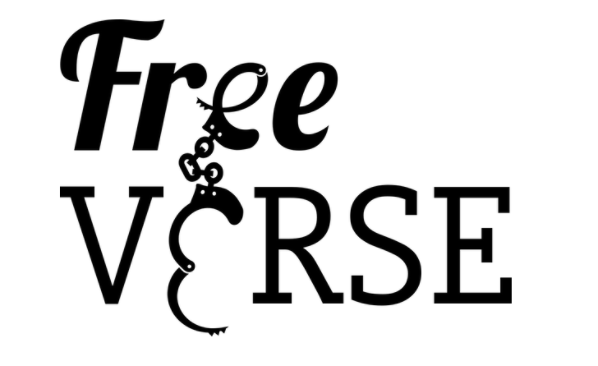Healing through Art: Expressions of incarcerated youth on display at ZACC
By ABBY LYNES at The Missoulian
In Chris La Tray’s classroom, every poem begins with a story.
“I was trying to engage them in conversation,” he said. “‘What’s your life like?’”
Chris La Tray sits at the "Shape of Us" exhibit for which he taught poetry to incarcerated youth through the Free Verse project.
TOM BAUER, Missoulian
The Métis writer was part of a project funded by a grant awarded to Free Verse to bring BIPOC artists to the Missoula Juvenile Detention Center and the Pine Hills Youth Correctional Facility to teach virtual arts workshops. Rapper R’Know taught hip-hop songwriting, Blackfeet artist Valentina LaPier taught visual art with pastels, and La Tray taught poetry.
Founded by a group of University of Montana MFA students, Free Verse is a nonprofit that teaches arts and writing to incarcerated youth across Montana. Recent work from its students is on display at the ZACC and includes work from the three Montana-based BIPOC artists’ workshops as well as art and poetry from a zine put together during the initial lockdown of the pandemic.
The exhibit is titled “Shape of Us” and features art and writing about isolation, identity, family and more. La Tray said he tried to talk to them as a peer instead of an authority figure, and he focused on storytelling in teaching the students how to write poetry, rather than teaching form and structure.
“For a long time in my life, I was taught what poetry was supposed to be wasn’t for me,” he said. “In that setting, it’s important to have them write in any format.”
The result of his approach was something powerful, he said. Many of the students wrote about physical abuse, loneliness and other difficult themes. Much of it was dark, but much of what the students were experiencing as incarcerated youth was dark, La Tray said. He told them to embrace the darkness in their writing.
“So often, poetry gets all the edges rounded off it in the editing process, and this stuff is real,” he said. “Sometimes you get so much more from the untrained than those who were trying to be a genius.”
Valentina said she saw the same authenticity in her classroom. Using pastels, much of her students’ work on display at the ZACC depicts animals that the teens identified with, ranging from a bald eagle to an orange tabby cat to a deer with text reading, “Please pray for the water.”
“We were doing animals at first, and I was having them identify what they’ve seen in the animal world and self-identifying … using animals to describe those feelings and thoughts they had about themselves,” she said.
Many of her students were talented artists, better at thinking outside the box than she was, she said. Experiencing their senses of humor and teaching them a coping skill that is mental, physical and emotional was the most rewarding part for her.
“They are beautiful children that can heal from whatever they’ve gone through and have been subjected to,” she said. “And they can do that through expression of art.”
It’s important for students to be taught by a BIPOC artist, considering the disproportionate rate of Indigenous and Black children incarcerated in Montana, she said. It helps Indigenous students with self-identification and helps them to feel less lonely. And for non-Native students, she said it helps open their minds to other cultures, images and ideas.
It is important for students to see their experiences reflected back at them, Free Verse Executive Director Nicole Gomez said. In the Montana juvenile justice system, 14% are Native and 4% Black, a very high number compared with the state’s general population, which is 6.7% Native, 0.6% Black. Over-representation of non-white people in prison is common nationwide.
Many stories of incarcerated children are erased and they are literally invisible, Gomez said. That’s why their stories are so important to share.
“I think you see that in the exhibit in the art they produce and the poetry they write, and how many of them that have taken to poetry and art in our workshops as a way of coping,” she said. “Incarceration itself is a form of trauma, so they’re in need of coping mechanisms, and art can do that.”
“Shape of Us” will be on display at the ZACC until Jan. 28. Hours are from 10 a.m. to 6 p.m. Monday through Saturday and noon to 4 p.m. on Sunday. Admission is free. A book of students’ writing is available for purchase in the ZACC gift shop.


